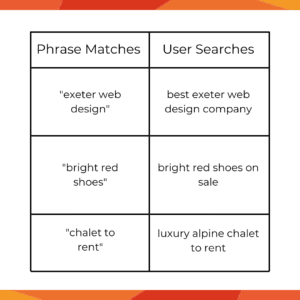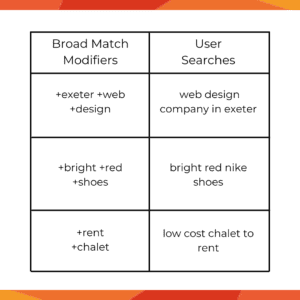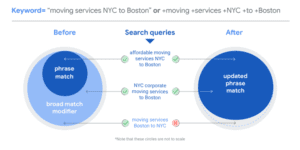 01392 914033
Offices are currently closed
01392 914033
Offices are currently closed
Google recently released an announcement in regards to its Adwords platform, with changes set to be made for its phrase match and broad match modifier keyword types. The alterations will lead to Google placing the best of broad match modifier in phrase match, to give Adwords account managers better control over their keywords.
Once Google has achieved this, they will ultimately discontinue the broad match modifier keyword type. Changes to the matching behaviour of phrase match and broad match modifier keywords started rolling rolling out on 18th February 2021 and phrase matches will completely replace broad match modifier in July 2021. Here, our expert marketing team looks at this topic in greater depth and explores how the changes may affect or benefit the running of an Adwords account.
To start off with, let us provide some information about Adwords keywords in general. In Adwords, search keywords are added to your campaigns as those terms you wish to bid on and your ads to show for these in search results. For example, if you have a company that sells oak kitchen tables, you may include keyword variations such as ‘oak kitchen tables’, ‘kitchen table oak’, ‘kitchen tables made from oak’ etc. On the contrary, terms can be added as negative keywords, meaning your ads will definitely not show for such terms – as an example on from the above, you would want to make ‘steel kitchen tables’ and ‘kitchen table pine’ are negative keywords, so you don’t advertise for them and waste your budget moving forward.
So, what is a phrase match keyword?

A phrase match keyword is added with quotation marks and, once added, your related ads can show for any search query that contains the meaning of your inputted keywords. Below is an example of how your added phrase match terms can be contained within user searches.
What Is A Broad Match Modifier Keyword?

When adding a broad match modifier as a keyword, the Adwords account manager enters all of the relevant terms with a ‘+’ in front. So, if all of the terms that have been added in a given broad match modifier are present in a user’s search, your ads are eligible to show. Just like any other type of keyword type in Adwords, you bid on the individual keyword and this will determine the placement of your ad in search results. Below is an example of how your added broad match modifier terms can be contained within user searches.
As mentioned, phrase matches will use some of the current functionality of broad match modifier, in order to assist both companies and searchers to find each other. So, just how will phrase matches change? Well, an Adwords account manager currently using broad match modifier for the keyword terms +moving +services +Exeter +to +Bristol may show up for the search term “moving services Exeter to Bristol”. However, currently, their ads may also appear in search results when the search term “moving services Bristol to Exeter” is inputted.
This, of course, may not be beneficial for either the company using Adwords or the searcher, if the company only offers moving services in the one direction and the searcher is only looking for companies based in Exeter. Google’s updated matching behaviour will rectify these issues as phrase and broad match modifier keywords will be more targeted and not show ads for search queries “from Bristol to Exeter” in this instance. For a visual representation of these changes, see Google’s image below, in which they have used Boston and NYC, as opposed to Exeter and Bristol.

Source: Google Announcements
As the image suggests, the new phrase match will continue to respect word order, but only when it is relevant to the meaning of the specific search. So, the updated matching behaviour of both phrase and broad match modifier match terms means that ads should be more relevant to searches moving forward.
This is, ultimately, Google’s goal. Commenting on the changes to matching behaviour, Google stated: “We’ve seen that phrase match and broad match modifier often serve the same use cases, and that you can reach more of the right customers through a combination of the two.”
Google also provided examples of how the matching behaviour will positively affect the relevance of ads to search queries. For example, the following broad match modifiers and search queries will NOT match under the new matching behaviour:
In contrast, the following phrase matches and search queries WILL match under the new matching behaviour:
Broad match modifiers were introduced in 2018 as a means of providing greater reach in search results. Therefore it’s been a relatively short stay for the match type but, with the new matching behaviour, Google appears to be making a step in the right direction. The new matching behaviour has been applied to both phrase and broad match modifier keyword types, meaning there is no need for Adwords account managers to migrate their keywords. As such, performance data will not be lost on existing broad match modifier terms. From July 2021, we will not be able to add a new broad match modifier. Instead, Adwords account managers can use a phrase match to add a term that they would have previously added as a broad match modifier.
At Media Street, we manage a host of Adwords accounts, for companies stretching across wide-ranging industries. If you are a current Adwords client of Media Street and would like more information on how the changes may affect your campaign or would simply like to discuss how your campaign could benefit from the enhanced use of phrase matches, contact us today. Equally, if you would like to discuss starting an Adwords campaign with our marketing team, give us a call on 01392 914033 or send an email to [email protected]. With Media Street being a Google Partner, you’ll receive up to £120 of ad credit in your second month, as Google will match your spend in the first month.